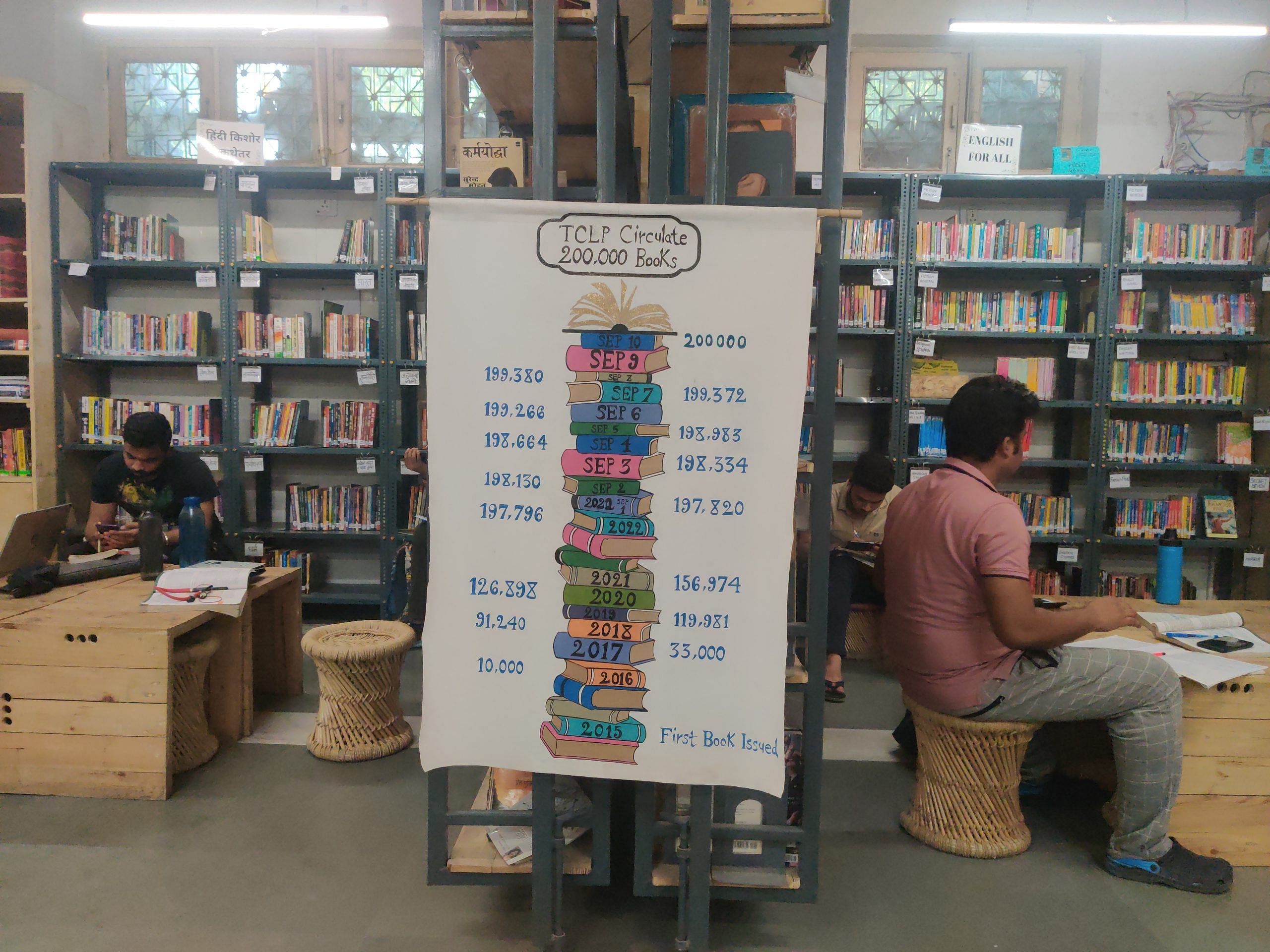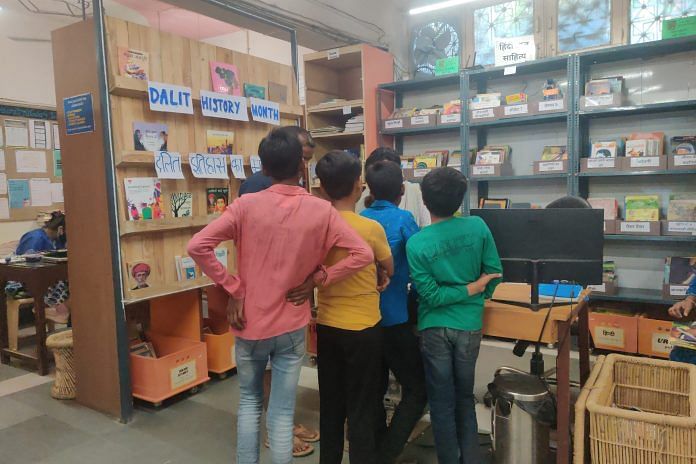New Delhi: A group of children in an English class are seated on a mat and listening to a student ‘leader’ with rapt attention. Others pore over a picture book, occasionally muffling giggles. In the adjoining room, teenagers are hunched over laptops. Once a space for havans and weddings, the basement of Dharam Bhawan in South Delhi’s Kotla Mubarakpur, is now a full-fledged library with special focus on caste, class, and ability inclusion.
Inspired by Dr BR Ambedkar, Delhi-based Community Library Project is taking forward its initiative of making books and stories accessible to everyone. After Sikanderpur in Gurugram and Khirki Extension in Delhi, the TCLP opened its third ‘Universally Accessible Library’ in Delhi’s South Extension on 14 February.
The library walks the talk in every way. It does not seek ‘official’ documentation like Aadhaar card for membership, nor does it ask its members to list the educational qualification of their parents. Moreover, students/members are encouraged to challenge the authors, stories, plots, ideas, and come up with their own. There are no fines for returning books late. If a book is damaged, a member is encouraged to repair it.
The inclusionary practices of the community library extend to its infrastructure as well. The ‘main’ entrance is at the back of the building to allow the front portion to be used for ramp by the differently abled.
‘Pyaar se’ (with love) is the underlying principle of TCLP — and its libraries are practising it to the tee.
“I remember that 60 people became members on the first day,” said Pooja, project coordinator at TCLP’s South Extension branch. As many as 200 people from the neighbourhood visited the library when it opened on. “This shows that such libraries are really necessary,” Pooja added.
Tucked away in a tiny bylane, the Dharam Bhawan library has become a refuge for people with literary passions; most readers are children and teenagers. And they’re seeking not just knowledge but also acceptance.
“I like that no one scolds me here or stops me from taking any book I like,” says 10-year-old Anmol, who started visiting the library with his friend a few weeks ago.
Also read: Non-Dalits can go through life not knowing Ambedkar’s work, jolt needed: Author Ashok Gopal
No silence, please
Traditional libraries evoke images of stern librarians enforcing rules like pin-drop silence. But UALs aren’t bound by such restraints. Here, chatter is encouraged.
“We believe dialogue is a crucial element of learning. And that is why we encourage conversations. Silence can be oppressive for people who do not have access to reading,” says Mohammad Amaan, one of the many benefactors of TCLP. The 21-year-old student had first visited the library in Khirki a year and a half ago and is now a core member at the South Extension branch.
Nothing obstructs the access to the books in the library — not even glass panes. The open shelves convey an invitation to touch, feel, and read.
“Just being part of an organisation does not necessarily do away with exclusion. It has to reflect in every aspect,” says Kamna Singh, librarian and a consultant for TCLP.

Apart from the ubiquitous selection of children’s fiction and non-fiction books, some shelves are exclusively arranged. One titled ‘Reading for Justice’ has books on gender, caste, and disability. Narratives from the Dalit community are placed alongside Braille books.
The motto of the UAL is highlighted in a message pasted on both the notice board and on top of the shelf titled ‘Reading for justice’.
“Throughout history, reading books and stories have been limited to a specific caste, class and body type. UAL is dedicated to empowering and enabling people from marginalised castes, classes, gender, and people with disabilities to read books and write their own stories,” it reads. TCLP also has a digital library called ‘Duniya Sabki’ — access is free and it’s updated regularly.
Also read: Walking librarian — the Kerala woman who distributes over 500 books a month on foot
Reader first, identity later
Unlike most government libraries that relegate signboards, old yellowing notices, posters and dark dusty corners, TCLP’s libraries see information dissemination as a process of power-sharing.
Information on affordable and urgent medical assistance, mental health, and sexual harassment awareness — ‘bad touch, good touch’ is prominently displayed on the UAL notice board. It also has a list of resources available for members seeking help with college admissions and offers free wifi access.
The library is open Monday to Friday from 10 am to 6 pm to both members and non-members. On weekends, it is 1 pm to 9 pm. Adults can visit the library from 5-9 pm on weekends.
The idea is to let the members — many of whom are first-generation school-goers — identify as readers instead of belonging to the Dalit or minority or certain class categories. That is how the library has become a shared community space, facilitating the growth of everyone who is a part of it. Classes for English and Hindi, art, and even rap music are regularly organised to foster a sense of community and belonging.
Each member who completes reading 10 books finds mention in the ‘hall of fame’ — a sheet put up on the notice board with a colourful star next to the member’s name. Each star represents 10 books. Right now, on the notice board, there are names with 10 stars too; most are young children who turn up every day after school to read, discuss ideas, and meet peers.
Need govt help
TCLP is faced with many challenges — from sourcing books to ensuring the space is respected.
For now, Dharam Bhawan has lent the space to TCLP on a 10-year lease. The library has 11,000 books, which are sourced at discounts from various publishers, especially those that produce anti-caste works.
“People often think they can drop their unused books here. But we do not encourage acts of charity in this space,” said Amaan.
TCLP members say that such libraries are the need of the hour, and change can be effected only through government intervention. “There should be more such free libraries. This will not be possible unless changes happen at the policy level,” says Prachi Grover, co-director at TCLP.
Also read: In Punjab, a library’s silent digital revolution is preserving the state’s heritage
Commitment, not merit
Student leaders and core group members at TCLP are responsible for circulating books and organising read-aloud sessions and programmes with the help of staff and volunteers.
Unlike the usual idea of leadership programmes, TCLP libraries allow everyone to be an equal stakeholder.
“The selection of people for either the students’ group or core group is not merit-based. It is simply based on who is truly committed to working toward the library,” says Nunihar Khatun, a core group member.
Preeti, Payal, and Mansi, three student leaders of the Khirki branch say they feel empowered by their role in the library community. They say that their ideas and thoughts get restricted in school, but the library offers them a space where they are listened to, especially through read-aloud programmes. “I was nervous during my first read-aloud. But now I organise them for other children,” said Mansi. They are all 15 years old.
The read-aloud initiative encourages children to voice dissent and share alternate narratives if they don’t agree with a particular author.
The message is loud and clear—reading is an act of power.
(Edited by Humra Laeeq)



